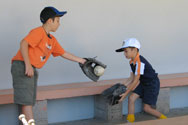Understanding Keiki Behavior
 Keiki who experience major changes in their lives often react in ways you may not expect. Here are some ways that can help you to understand why keiki behave the way they do and help you to identify which behaviors might require professional help.
Keiki who experience major changes in their lives often react in ways you may not expect. Here are some ways that can help you to understand why keiki behave the way they do and help you to identify which behaviors might require professional help.
Common Concerns about Behavior
Keiki who are being cared for by their ‘ohana go through some unique changes. They are more likely than other children to show:- Strong fears
- Withdrawal
- Signs of depression
- Unusual friendliness to strangers
- Trouble developing important relationships
- Extreme stress and trauma, caused by painful memories
- Difficulty in school
- Signs of acting younger than their age
Understanding Behavior
 ‘Ohana sometimes worry about keiki’s challenging behaviors and how to manage them. These behaviors occur for different reasons, such as
‘Ohana sometimes worry about keiki’s challenging behaviors and how to manage them. These behaviors occur for different reasons, such as
- in response to a difficult event
- as a way to communicate or express feelings
- as a way to get attention
- as a way to direct attention away from another problem
It is important for you as the ‘ohana caregiver to understand these behaviors and ways you can respond to them.
- Listen to the underlying message that the keiki isn’t able to tell you in words.
- Seek ways to understand the events that caused the behavior.
- Communicate with keiki to understand their feelings.
Keiki like to have a routine and a safe environment. They respond to their ‘ohana’s behavior and feelings. If keiki are punished without their understanding the reason way, negative patterns can begin.
Warning Signs of Behavior Problems
Sometimes keikis do things that can harm themselves and others. ‘Ohana caregivers need to ask for professional help if their keiki show any of the following behaviors:- hurting (or talking about hurting) themselves, others, or animals
- excessive interest in violent materials
- withdrawing for long periods of time and having no interest in others
- not eating for several days or sleeping all the time
- angry outbursts, crying, and swearing
Suggestions for Responding
Sometimes keikis “act out,” making it hard for their ‘ohana to be kind and gentle. Remembering the following may help you respond in a positive manner:- Keiki still need kindness and gentleness, even if they turn away. Try not to get angry.
- Always be positive and supportive, even if you do not feel like it. When he or she is upset, the keiki needs you most.
- Keiki who have experienced unstable home environments especially need safety and consistency. They also need reassurance that you won’t desert them.
- Keiki who can’t control their feelings or actions need help to learn how. Maybe you can teach them by listening, sharing wisdom, and letting them have some time alone. Or, maybe you can help them by finding professional help.
Where to go for Help
If you are worried or overwhelmed by your keiki’s actions, there are many sources of support that you can turn to, such as- a trusted friend
- the keiki’s teacher or pediatrician
- your faith leader or spiritual counselor
- a support group for ‘ohana caregivers
- psychologists or social workers
